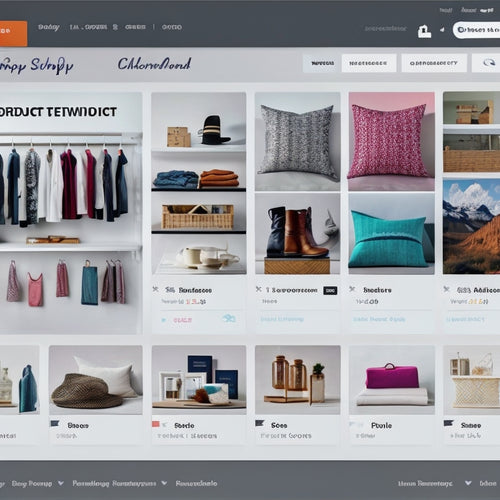
Mastering Online Payments: Your Ultimate Guide
Share
You're about to tap into the full potential of online payments, where a seamless checkout experience, robust security, and cost-effective transactions converge to drive business success. To achieve this, you'll need to understand the online payment essentials: payment gateways, SSL certificates, and merchant accounts. Combining these elements creates a crucial payment system that prioritizes customer data security. When choosing a payment gateway, consider fees, features, and integration requirements. A crucial part of securing online transactions is an SSL certificate, which encrypts sensitive customer data. Now, get ready to refine your online payment strategy and take your business to the next level.
Key Takeaways
• Mastering online payments requires a combination of payment gateways, SSL certificates, and merchant accounts for secure transactions.
• Choosing the right payment gateway involves evaluating fees, features, and integration requirements for a seamless checkout experience.
• SSL certificates are essential for encrypting sensitive customer data, such as credit card numbers, during online transactions.
• A seamless checkout experience is crucial for reducing cart abandonment rates and increasing customer satisfaction.
• Understanding online payment essentials leads to a superior customer experience and increased conversions.
Online Payment Essentials
When setting up an online payment system, you'll need to grasp the fundamental components that guarantee secure and seamless transactions, including payment gateways, SSL certificates, and merchant accounts.
SSL encryption is essential for protecting sensitive customer data, ensuring that transactions are secure and trustworthy.
A seamless checkout experience is also important, allowing customers to complete their purchases quickly and efficiently.
By combining these elements, you can create a reliable online payment system that instills confidence in your customers.
With a solid understanding of these essentials, you'll be well on your way to mastering online payments and providing a superior customer experience.
Payment Gateway Options
You're spoiled for choice with numerous payment gateway options available, each offering distinct features, pricing structures, and integration requirements.
When comparing payment gateway providers, consider their fees, payment gateway features, and integration options.
Some providers, like PayPal Payments Pro and Payflow Pro, offer seamless solutions, while others, like Authorize.Net and First Data Global Gateway, provide remote payment options.
You'll need to evaluate their fees, such as transaction rates and monthly charges, to determine which provider best suits your business needs.
Additionally, consider the complexity of integration, as some providers require more technical expertise than others.
Securing Online Transactions
Securing online transactions is essential to protecting sensitive customer data, and an SSL certificate is a must-have for establishing a trusted connection between your website and customers' browsers.
You'll want to make sure that all data exchanged between your site and customers' browsers is encrypted using SSL encryption. This is particularly vital for transmitting sensitive information like credit card numbers and passwords.
By using an SSL certificate, you'll be able to provide a secure connection, denoted by the 'https' protocol, which is important for data security. This will give your customers peace of mind, knowing that their personal information is protected from prying eyes.
Frequently Asked Questions
Can I Use Multiple Payment Gateways on My Ecommerce Site?
You can definitely use multiple payment gateways on your ecommerce site, achieving gateway integration and boosting payment flexibility for customers; simply set up accounts with each provider, obtain API credentials, and integrate them into your ecommerce platform.
Do I Need a Business License for Online Transactions?
You'll likely need a business license for online transactions, as it's required for business registration in many jurisdictions. Additionally, you'll need to guarantee sales tax compliance, as online sales are subject to tax laws in various regions.
How Do I Handle Recurring Subscription Payments Online?
You'll need to set up recurring invoices with a specified payment frequency, such as monthly or annually, using a payment gateway like PayPal or Authorize.Net, which supports automated subscription payments and invoicing.
Are There Any Online Payment Solutions for Non-Profit Organizations?
"As a nonprofit, you're a beacon of hope, shining bright in the digital landscape. You'll shine even brighter with donation platforms like Network for Good, Qgiv, and GiveLively, offering seamless charity integration for effortless fundraising."
Can I Customize the Checkout Experience for My Customers?
You can customize the checkout experience for your customers by ensuring brand consistency across all devices through mobile optimization, tailoring the layout and design to your brand's unique identity and voice.
Related Posts
-
Boosting Content Marketing SEO: Effective Internal Linking Strategies
Effective internal linking strategies are a crucial component of boosting content marketing SEO. Internal linking pl...
-

How Do I Add Unlimited Products to Shopify
This article explores the process of adding unlimited products to the Shopify platform, a popular e-commerce solutio...
-

Why Is Shopify SEO Important
This article examines the importance of Shopify SEO. It discusses the benefits of optimizing SEO on Shopify, provide...

